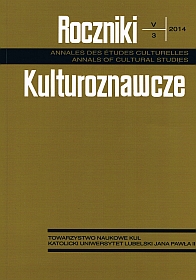Norwid – Far from the Canon of the Epoch
Abstract
About Freedom of Speech by Cyprian Norwid goes—like Goethe’s Faust—beyond the limits of intelligibility. “Maybe—as Heidegger claims—language requires much less hast for words, than deliberate silence.” The Polish poet cuts himself off from the canon of philosophical views—like a child who wants to discover the world in its own way, not to learn it by using knowledge and education, following the designated track. In his works Norwid abandons the canon of his epoch’s poetry and he, so to say, cuts across. He occupies an outstanding position on the background of contemporary European writers. The advocate of the motto: “art for art’s sake” Stefan Mallarmé and Norwid are definitely different as far as the attitude towards current events is concerned, however they are united in their willingness to go beyond the boundaries of the word. In Norwid’s works it is manifested by a constantly used technique of being silent and it culminates in incredible amazement and dazzle: “In this moment I touched the Resurrection with my finger / and I pronounced the word: I AM.” On the other hand, in Mallarmé’s output we deal with presenting internal images which subconsciously evoke musical vibrations. Norwid shares with Godfryd Benn the belief that the “ETERNAL MASTER” and the liberating knowledge of the Word play indispensable roles in history. On the other hand, what the Polish poet and Ezra Pound have in common are: an immense reading canon, great knowledge and extraordinary poetic images. The coming of the new epoch caused a disturbance of the previous hierarchy of works and at the same time—as it is in Norwid’s case—a manifestation of what had not been noticed so far.
References
Das Land Ulro nach Schließung der Zimtläden: Stimmen aus Deutschland, Polen, Tschechien und Ungarn. Hg. P. Gehrisch, A. Helbig. Dresden: Sandstein 2000.
Das reicht für eine Irrfahrt durch Polen / Wystarczy na wyskok w Polskę. Leipzig: Leipziger Literaturverlag 2010.
Es ist Zeit, wechsle die Kleider: Stimmen aus Polen. Hg. P. Gehrisch, D. Krause. Dresden: Literarische Arena 1998.
GEHRISCH Peter: Die Bilder, die Wörter, das Schiff. Leipzig: Leipziger Literaturverlag 2013.
GEHRISCH Peter: Hans-Theodors Karneval oder Das Federnorakel. Leipzig: Leipziger Literaturverlag 2006.
GEHRISCH Peter: Poetische Nautik in Nöten. „Ostragehege” nr 52/2008r.
GEHRISCH Peter: Der glimmende Ring meiner Lichtwissenschaft. Mit 9 Carbonografien von G. van Smirren und einem Nachwort von H. Giebe. Leipzig: Leipziger Literaturverlag 2014.
Heimkehr in die Fremde. Stimmen aus der Mitte Europas. Hg. P. Gehrisch, A. Helbig. Dresden: Literarische Arena 2002 r.
Jestem czarodziejem prochów. Spotkania z poezją. / Ich bin der Zauberer des Staubs. Begegnungen der Poesie. Hg. P. Gehrisch. Jelenia Góra / Dom Vade-mecum 2007.
NORWID Cyprian Kamil: Das ist Menschensache!... Ausgewählte Gedichte polnisch und deutsch. Übers. und Hg. P. Gehrisch. Dresden: Thelem 2003.
NORWID Cyprian: Über die Freiheit des Wortes / Rzecz o wolności słowa. Übers. und Hg. P. Gehrisch. Leipzig: Leipziger Literaturverlag 2012.
Orpheus versammelt die Geister. Stimmen aus der Mitte Europas. Sonderpublikation von Ostragehege. Hg. P. Gehrisch, A. Helbig. Drezno: Literarische Arena 2005.
Orpheus. Gespräch im Wort / Orfeusz. Rozmowa w słowie. Hg. P. Gehrisch. Dresden: Literarische Arena 2001.
Poezja jako przek_ad niewymownego / Dichtung als Übersetzung des Unsagbaren. Hg. P. Gehrisch. Jelenia Góra: Dom Vade-mecum 2008.
STRUGAA Wojciech Izaak: Phantasmagorien / Fantasmagoria. Ausgewählte Gedichte polnisch-deutsch. Desgl. CD. Übers. und Hg. P. Gehrisch. Leipzig: Edition Erata 2005.
Z ust źródeł. Spotkania z poezją (Polska, Niemcy, Czechy, Ukraina, Holandia) / Aus Brunnen-Mündern. Begegnung der Poesie. Hg. P. Gehrisch. Dresden: Literarische Arena – Lwówek Śląski: Dom Vademecum 2006.
Zielona granica / Die grüne Grenze. Polsko-saksońska antologia poetycka / Polnisch-sächsische Anthologie (Gedichte). Hg. E. Dyczek. Wrocław: Okis 1995.





